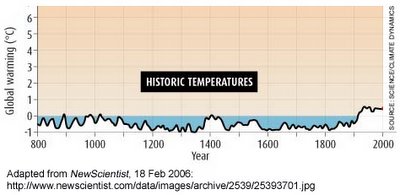Global warming, the trend

The NewScientist graph helps to show that the current warming is a sustained period of increased temperatures with no historical precedent, but the original graphs from Science are far more detailed, and to my eye, alarming. I do not claim to understand all of the authors’ notes regarding their data collection or interpretation; for that I must defer to the peer review process. But assuming these graphs are an accurate representation of reality, we seem to be headed for completely new, and frightening, territory.


Everywhere you look, there will be repercussions to a sustained warming trend, including the already documented increased severity of storms, destruction of coastal habitats (human and otherwise), increased numbers of extinctions for species unable to adapt quickly enough to sustained warming, and impacts on food production (from storms, reduced pollinators, droughts and flooding, temperature extremes, lengthened fire seasons).
It’s hard to understand the seeming complacency that greets this information, the general unwillingness of most people to change their own behavior in the slightest, most trivial sort of way, to try to stave off such grim scenarios. It’s hard to understand how people are willing to bequeath such a grotesque disaster onto their innocent descendants. It is unfathomable to me that people professing to be religious have such contempt for God’s creation as to besmirch and destroy it in the space of little more than a generation.
Being without progeny, I am tempted at times to a feeling of relief that I “have no dog in this race,” but really I do. Life, all life, is such a precious and miraculous phenomenon, that I cannot but mourn the destruction of its tiny oasis, the “skin” of this little orb spinning through space. If, as many climatologists believe, the current warming is but the beginning of a destructive overheating of the planet, we are on the verge of a mass extinction that will make all previous extinctions look like picnics. But go ahead: crank up that big SUV, and heat your big house to 80°F in winter, and cool it to 65°F in summer, and cruise in your big motor boat, and fly in your big jet plane, because none of it matters. We’re all gonna die anyway. Might as well take the rest of them with us.



